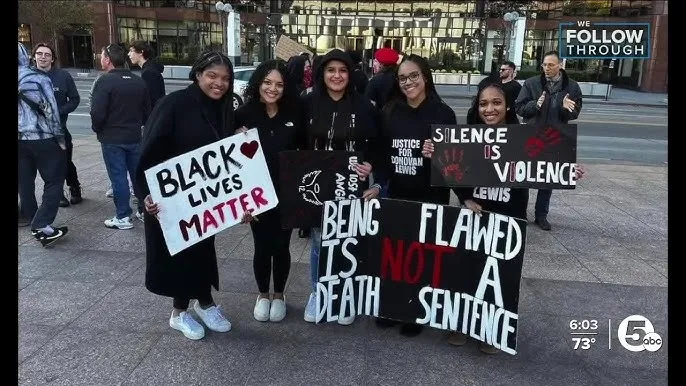Introduction
In a bold move that could reshape law enforcement accountability in the state, Ohio activists are gathering signatures for an amendment aimed at abolishing qualified immunity for police officers. This legal doctrine, which has shielded law enforcement from civil lawsuits for constitutional violations, has come under increasing scrutiny following a recent U.S. Supreme Court ruling that opened the door for states to redefine their own approaches to police immunity.
The Background on Qualified Immunity
Qualified immunity is a judicial doctrine that protects government officials, including police officers, from being held personally liable for constitutional violations unless the violated right was ‘clearly established’ at the time of the incident. Critics argue that this has led to a lack of accountability, allowing egregious behavior to go unpunished. Proponents maintain that it is necessary to protect officers from frivolous lawsuits and to allow them to perform their duties without fear of constant legal retribution.
Recent Developments in the Legal Landscape
The recent Supreme Court decision that cleared the way for Ohio to potentially amend its constitution has provided activists with renewed optimism. The court ruled that states are free to create their own laws regarding qualified immunity, encouraging a grassroots movement to challenge the status quo. The ruling has been interpreted as a signal that states have the authority to provide more extensive rights for citizens seeking justice against police misconduct.
Ohio’s Activist Movement
In Ohio, a coalition of civil rights groups, criminal justice reform advocates, and concerned citizens have banded together to form a formidable movement to end qualified immunity. Their strategy centers on collecting signatures to place a constitutional amendment on the ballot, which, if passed, would eliminate the protections granted to police officers under the current statute.
Grassroots Organizing
The activists have launched a statewide campaign called “Accountability Now,” aimed at raising awareness and mobilizing community support. They have organized town hall meetings, participated in public forums, and utilized social media platforms to connect with citizens across Ohio. The campaign’s core message emphasizes the need for transparency, accountability, and justice in law enforcement.
Legislative and Public Support
Despite facing opposition from some law enforcement unions and political organizations, the movement has garnered significant public support. Polls show that many Ohioans are increasingly concerned about police accountability and believe that changes to the qualified immunity system are necessary to ensure justice for victims of police misconduct.
Challenges Ahead
While the push to end qualified immunity is gaining traction, challenges remain. Activists must not only gather enough signatures to qualify for the ballot but will also need to fend off significant political and legal opposition from powerful law enforcement organizations and conservative groups who argue that ending qualified immunity would have detrimental effects on police operations and community safety.
Political Ramifications
Political leaders from both parties have weighed in on the discussion, with some expressing support for reforming qualified immunity. However, others have voiced concerns about the implications of such changes, arguing that eliminating these protections could lead to a larger number of lawsuits against police officers, which could ultimately hinder their ability to perform their jobs effectively.
The Role of the Ohio Attorney General
Ohio Attorney General Dave Yost has also weighed in on the discourse surrounding qualified immunity, stating that while he recognizes the need for police accountability, he is concerned about the potential repercussions of any amendments that could hinder law enforcement’s ability to protect the public. His office has certified the proposed amendment for signature gathering, marking a significant step in the activists’ mission.
Legal Support and Implications
The legal implications of this push are profound. If the amendment succeeds, it could set a precedent in Ohio that other states may choose to follow, creating a domino effect across the nation. Legal experts have pointed out that such changes could lead to an increase in civil rights litigation and reshape conversations around police practices and accountability.
Community Impact
For many community members, the potential amendment is about more than just legal reform; it symbolizes a demand for change in how policing is perceived and conducted in Ohio. The movement’s advocates argue that the elimination of qualified immunity would empower victims of police misconduct and foster greater trust between law enforcement and the communities they serve.
Voices from the Community
Local activists have shared powerful testimonies about their experiences with police and the challenges faced in seeking justice. Many have expressed hope that ending qualified immunity will create accountability within police departments, reducing instances of misconduct and rebuilding trust in law enforcement.
Conclusion
The push to end qualified immunity in Ohio represents a critical juncture in the fight for police accountability and civil rights. As activists continue their grassroots efforts and engage with the public, the potential for meaningful change looms on the horizon. With the backing of the community, and as legal frameworks evolve, Ohio could become a national leader in redefining the relationship between law enforcement and the people they are sworn to protect.
Call to Action
As the movement gains momentum, Ohio residents are encouraged to get involved—whether by signing the petition, educating themselves about the implications of qualified immunity, or participating in local discussions about police accountability. The outcome of this initiative could reverberate across the nation, making it more important than ever for citizens to engage in shaping their communities’ future.







